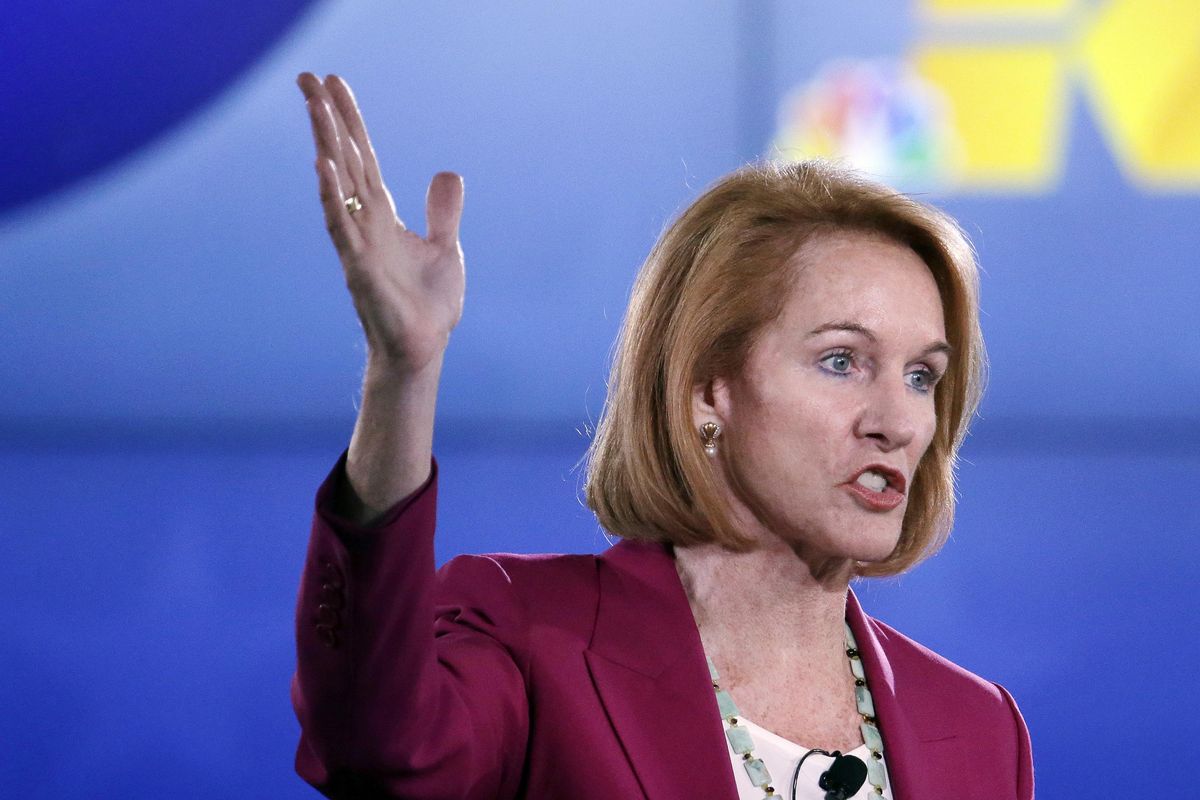Jenny Durkan defeats Cary Moon to become Seattle’s first woman mayor since the 1920s

Seattle will have its first woman mayor since 1920s — and it’ll be Jenny Durkan.
Durkan won 61 percent of the vote in Tuesday-night returns, claiming a decisive lead over opponent Cary Moon after a roller-coaster election season that saw Ed Murray resign as mayor and 21 candidates clash in a super-competitive primary.
Though Moon isn’t yet giving up — with about half the number of expected ballots still to be counted — a crowd of Durkan supporters gathered at a downtown hotel cheered as the night’s tally was announced.
“I know there’s a lot of votes to be counted,” Durkan said, stopping just short of claiming victory and thanking Moon for the battle. “But we are feeling really, really good about where we are.”
The candidate mentioned challenges, including homelessness, gridlock, a lack of affordable housing that’s “crushing Seattle” and a U.S. president whom few in the city voted for.
“We really can show what it looks like when progressive values are put into action,” she said, adding, “Donald Trump, keep your hands off Seattle.”
Durkan mentioned Bertha Knight Landes, who won the city’s highest office in 1926 and served until 1928. And she noted that a tunnel-boring machine had been named after the leader.
“Ninety-two years later, Seattle is about to have a new woman mayor,” Durkan said, joking, “Just imagine what they’re going to name after me.”
Addressing her own backers in a packed Pike Place Market bar, Moon said she wasn’t conceding. The urbanist and waterfront activist said she hoped to close the 21-point gap as more ballots are counted in the coming days.
Ballots counted later in Seattle tend to be cast by younger voters for more activist candidates, with the trend leading in previous contests to swings of as much as eight percentage points after Election Day.
“We’re up against really tough odds,” Moon said, citing Durkan’s support from deep-pocketed corporations as a key factor in the race. “But Seattle late voters may surprise everyone.”
Durkan marched into Election Day with significant advantages, having been endorsed by more local politicians, business groups and labor unions and having spent almost three times as much money as her rival.
Moon, an urbanist and waterfront activist best known for opposing the Alaskan Way Viaduct replacement tunnel, spent a small fortune of her own money while seeking support from progressive voters with qualms about Durkan’s establishment ties.
Questions about homelessness and housing costs dominated their head-to-head contest, as both vowed to create more shelter space and subsidized apartments.
Durkan, 59, promised to bring greater urgency to Seattle’s homelessness response and reform the city’s homeless-services system, while Moon, 54, vowed to curb evictions of homeless people from unauthorized camps and lobby for a statewide capital-gains tax.
Jeanne Kohl-Welles, a Metropolitan King County Council member who sided with Durkan, said many voters from the Hillary Clinton wing of the Democratic Party backed the lawyer while many from the Bernie Sanders wing got behind Moon.
In her Tuesday night speech and in a written statement, Moon pointed out that the Seattle Metropolitan Chamber of Commerce had channeled hundreds of thousands of dollars from large corporations to a pro-Durkan, independent spending committee.
She named Comcast, CenturyLink, AT&T and Amazon as businesses that had contributed to the effort, then thanked her family, campaign team and volunteers.
“What I have learned in the last six months is this,” she said in her statement. “The only real strength is the strength we build by doing hard work, together.”
Moon added, “Seattle’s voters won’t let the future of our city be sunk by status quo thinking and politics as usual. There is too much at stake. We look forward to the next few days of ballot returns.”
Their showdown wasn’t what anyone was predicting early this year, when then-Mayor Ed Murray was widely expected to cruise to victory and a second term.
Then multiple men publicly accused Murray of sexually abusing them decades ago, when they were teenagers. Murray vehemently denied the accusations but cited them when he ended his re-election campaign in May, throwing the race into turmoil.
Educator and activist Nikkita Oliver, who had challenged Murray before the allegations surfaced, ramped up her campaign with a surge of grass-roots support.
Former Mayor Mike McGinn and Moon announced bids after the claims emerged but before Murray dropped out, while other major candidates waited for the mayor to exit.
When he did, Durkan jumped into the race, along with state Sen. Bob Hasegawa and Jessyn Farrell, who left her seat in the state House of Representatives in the process.
The August primary was a whirlwind, as the new candidates scrambled to put together their campaigns in record time and make their voices heard above the din.
“We were flying this campaign as we were building it,” Durkan said Tuesday night.
Murray toyed with the idea of re-entering the race as a write-in candidate after a lawsuit against him was dropped. But he ultimately decided to endorse Durkan instead.
Durkan and Moon advanced from the primary, but their contest was briefly overshadowed when a younger cousin of Murray became the fifth man to publicly accuse him of sexual abuse. Murray resigned within hours, setting off a bewildering series of events that included City Council President Bruce Harrell becoming mayor and then making way for Councilmember Tim Burgess.
The mayor-elect will officially take over from Burgess on Nov. 28,when the results of the election are certified.
The race sharpened last month, as the Durkan and Moon campaigns traded election-law complaints and negative television commercials. Durkan linked Moon to McGinn and questioned her qualifications to manage a 12,000-employee bureaucracy, while Moon identified Durkan with Murray and blasted her as a “corporate lawyer.”